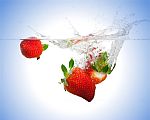Have you ever heard of Superfoods? Well, I have. But I was not so sure about the meaning of the word, though my friend sells organic and healthy food and „massages“ me quite well. So I decided to discover this secret world of Superfoods for me – and of course for you as well.
First I looked the term up in some dictionaries. Macmillan says: Superfoods is a food that is considered to be very good for your health and that may even help some medical conditions. The Oxford Pocket Dictionary of Current English explains it as a natural food regarded as especially beneficial because of its nutrient profile or its health-protecting qualities. So now you know, or don´t you? OK, let´s have a look at it closely.
When you open a webside of any e-shop selling organic food, you will definitely find a wide menu of superfoods. In their articles to superfood products they write that superfoods are outstanding foods not only because of their ingredients but mainly because of their nutrients. The superfoods come from all over the world: New Zealand, Peru, the Philippines, Indonesia… All of the superfood should give you energy, stimulate the immune system and provide you with an incredibly high amount of substances strengthening your organism. The concentration of essential nutrients, such as vitamins, minerals, antioxidants and enzymes in these 100% natural foods is incredibly high.
Which foods are considered to be superfoods? These are mainly nuts, berries, seeds, dark green vegetables, fatty fish, seaweed, legumes and whole grains. So in the shops you may find for example green barley (instant green beverage made from dried barley grass), chlorella (weed usually in pills or powder), dulse (raw see vegetables), raw cocoa (cocoa beans), cashew nuts, goji (a kind of Asian berry), maca (a herb called Peruvian ginseng) or linseed oil.
But not all people believe in superfoods and their power. There is no scientific definition of superfoods and their merits remain scientifically unproven. „The term „superfoods“ is at best meaningless and at worst harmful,(…)‘ said Catherine Collins, chief dietician at St George’s Hospital in London. „Just because certain foods are bursting with a particular vitamin or nutrient does not mean they will be especially good for you.(…) If our bodies have an excess of nutrients and cannot store them, they will essentially go to waste.“ At the end she recommends eating „normal“ fruit and vegetables as they are usually fresher, easily available and cheaper.
Since 1 July 2007, the marketing of products as „superfoods“ is prohibited in the European Union unless accompanied by a specific medical claim supported by credible scientific research.
So what do YOU think? Are Superfoods extremely healthy or do they work as a good marketing tool?
Sources:
www.encyclopedia.com/doc/1O999-superfood
www.macmillandictionary.com/dictionary/british/superfood
www.vitamina.cz
http://en.wikipedia.org/wiki/Superfood
http://www.guardian.co.uk/uk/2007/may/13/health.healthandwellbeing1











